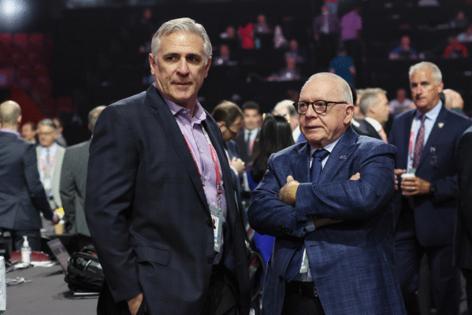Jason Mackey: Jim Rutherford has followed a familiar script with Canucks. Is there anything the Penguins can learn?
Published in Hockey
PITTSBURGH — While Penguins fans endure a second consecutive spring without playoff hockey, a familiar story featuring some Trader Jim guy who used to work here has transpired on the other side of North America.
Yep, ol' Jim Rutherford, 75 years young, has transformed the Canucks — with just one playoff visit over the previous eight seasons before this one — into legitimate contenders for the Stanley Cup.
Named president of hockey operations and interim general manager on Dec. 9, 2021, four days after former GM Jim Benning was fired, Rutherford has followed a familiar playbook to lead a spectacular turnaround in Vancouver.
The 2019 Hockey Hall of Fame inductee has actually pulled some of the same strings that have characterized his four-plus decades in the game, and there also could be a few lessons for the current Penguins regime.
I texted Rutherford to see if he'd be willing to reflect on the past couple of seasons, when the Canucks finished seventh, fifth and sixth before winning the Pacific Division with 109 points in 2023-24.
Rutherford politely declined, explaining he'd rather stay quiet while games were ongoing, which was qualified as a rarity for one of the chattiest GMs in the history of pro sports. But it also doesn't prevent me from writing what I've observed.
Culture change
The Penguins were struggling in December 2015. Former coach Mike Johnston wasn't reaching any of the team's star players. The group looked old and slow. Their record after a shootout loss to the Kings on Dec. 11, 2015: 15-10-3.
Swapping Mikes turned out to be a franchise-altering decision, as it resulted in the Penguins rediscovering their identity under Sullivan. The speed, the tenacity, the reliance on young players. It worked then. Resuscitating it now wouldn't be a bad idea.
It's been much the same in Vancouver, as Rutherford hired Rick Tocchet on Jan. 22, 2023. The Canucks finished 20-12-4 in 36 games under Tocchet in 2023-24. Now, Tocchet's direct approach (just like Sullivan), plus the culture created and the respect gained from players has led to arguably the best coaching job in the NHL this season.
Reaching stars
During Rutherford's Penguins tenure, a primary storyline was bringing out the best in Phil Kessel, which largely happened because of Tocchet. Viewed as a difficult player in Toronto, Kessel was the polar opposite for the Penguins.
You could argue Rutherford hiring Tocchet was the move one of his best players, Brock Boeser, needed to mature. The right wing jumped from 18 goals last season to 40 in 2023-24. His plus/minus went from minus-20 to plus-23.
It sounds simple, but few teams achieve success without their best players being exactly that.
Revamping the defense
It was an ironic storyline from 2014-15, when a Rutherford gamble left the Penguins with only five available defensemen one night. In reality, his Pittsburgh tenure was at least partially defined by improving the team's back end.
Rutherford added Trevor Daley and Justin Schultz for peanuts. They were huge parts of the two Cup runs. Ron Hainsey was a key deadline addition in 2016-17.
In Vancouver, Rutherford did a few key things. Drafting Quinn Hughes didn't hurt. Rutherford also pulled off a blockbuster trade to get Filip Hronek, added toughness with Nikita Zadorov and Carson Soucy and brought back another old friend in Ian Cole.
The result was an offensively gifted group that also excelled preventing goals; only four NHL clubs allowed fewer than the Canucks' 221 during the regular season.
Bold moves
Maybe you've heard this before: Rutherford likes to stay active in the trade market. It's been more than just a funny punchline in Vancouver. While he made his share of trades (and mistakes) in Pittsburgh, Rutherford also did an excellent job of moving on whenever something wasn't working.
With the Canucks, I think about trading previous caption Bo Horvat to the Islanders, netting the first-round pick that became Hronek. Though he wasn't responsible for the contract, Rutherford OK'd the most costly buyout in NHL history ($19.3 million) with defenseman Oliver Ekman-Larsson.
Anthony Beauvillier was part of the Horvat trade, the cap space allowing Rutherford to acquire Zadorov. Plus he added Elias Lindholm this year at the deadline.
Rutherford starting with James Neal for Patric Hornqvist set an important tone. The Kessel deal speaks for itself. Even Nick Bonino from his current place of employment. The Pittsburgh comps abound.
Creating an identity
It's not necessarily the speedy calling card of his Penguins teams, though the Canucks can play fast. But Rutherford, Tocchet and general manager Patrick Allvin (another Penguins transplant) have created a clear identity.
Dakota Joshua (18 goals, 32 points) has helped their bottom-six immensely. Pius Suter was a cheap signing last August who has been a snug fit with Boeser and J.T. Miller. A productive top-six wing on the cheap. Remember those?
Rutherford's transparency and candor with Canadian media bought time to make changes and mitigate negativity — same as Pittsburgh — while the Canucks have done well to extend deserving players such as Miller, Elias Pettersson and even Boeser (three-year deal).
The conclusion
None of this is to say the current Penguins regime is incompetent. Far from it. I actually think highly of president of hockey operations Kyle Dubas, and I'm eager to see how he repositions the Penguins this offseason.
But if there's anything to learn from 2015-17, as well as how it came apart, it's that the Penguins need to rediscover their identity. They certainly need to get more fast and physical, as Rutherford can attest, and those moves are rarely subtle in nature.
(c)2024 the Pittsburgh Post-Gazette Distributed by Tribune Content Agency, LLC.







Comments